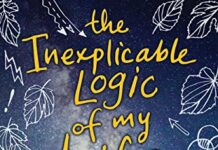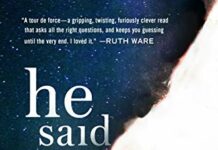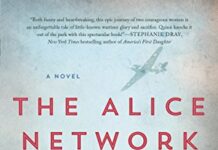
Ebook Info
- Published: 2017
- Number of pages: 567 pages
- Format: Epub
- File Size: 0.56 MB
- Authors: John Boyne
Description
From the beloved New York Times bestselling author of The Boy In the Striped Pajamas, a sweeping, heartfelt saga about the course of one man’s life, beginning and ending in post-war Ireland
Cyril Avery is not a real Avery — or at least, that’s what his adoptive parents tell him. And he never will be. But if he isn’t a real Avery, then who is he?
Born out of wedlock to a teenage girl cast out from her rural Irish community and adopted by a well-to-do if eccentric Dublin couple via the intervention of a hunchbacked Redemptorist nun, Cyril is adrift in the world, anchored only tenuously by his heartfelt friendship with the infinitely more glamourous and dangerous Julian Woodbead. At the mercy of fortune and coincidence, he will spend a lifetime coming to know himself and where he came from – and over his many years, will struggle to discover an identity, a home, a country, and much more.
In this, Boyne’s most transcendent work to date, we are shown the story of Ireland from the 1940s to today through the eyes of one ordinary man. The Heart’s Invisible Furies is a novel to make you laugh and cry while reminding us all of the redemptive power of the human spirit.
User’s Reviews
Review Praise for The Heart’s Invisible Furies:Finalist for the 2018 LAMBDA Literary AwardsFinalist for the 2018 Ferro-Grumley Award for LGBTQ Fiction“By turns whimsical and heartbreaking, Boyne’s sprawling novel treads Dickensian territory across seven decades of Irish history, ending with a redemption for both a country and a native son.” – People”Bleak, bittersweet, and Irish to the bone… explore[s] the relationship between Catholicism and patriarchy in midcentury Ireland and beyond.”– O, The Oprah Magazine“A picaresque, lolloping odyssey for the individual characters and for the nation that confines them…The book blazes with anger as it commemorates lives wrecked by social contempt and self‑loathing…. a substantial achievement.” – The Guardian”With intricate narrative precision, The Heart’s Invisible Furies cuts to the heart of what family is, how it is chosen, and how it endures. And it is charming and funny, even as it dives down from the precipice of endearing humor into the very specific ironies and cruelties of real life…. characters are cinematically rendered, with a deft, decadent wit that will make you laugh aloud at least once. Searing heartbreak; loneliness; a quest for internal and external redemption, solace, and contentment are all there in The Heart’s Invisible Furies.”– The Millions“This is nothing less than the story of Ireland over the past 70 years, expressed in the life of one man…highly entertaining and often very funny…Big and clever.” – The Times Sunday Review“An epic full of verve, humour and heart… sure to be read by the bucketload… deeply cinematic [and] extremely funny.” – The Irish Times”Boyne writes scenes that will make a reader laugh and cry—without saccharine sentiment or flippancy. Infused with heart and humor, as well as a keen sense of man’s capacity for cruelty, The Heart’s Invisible Furies pulsates with life’s complexity and progress’ slow march.” – Paste “A big, sweeping novel…Cyril’s intelligent, witty voice takes us all the way through to the end of his life. The Heart’s Invisible Furies is a brilliant, moving history of an Irishman, and of modern Ireland itself.” – Minneapolis Star Tribune“The most inviting and completely spellbinding book this author has ever written…an outstandingly memorable achievement.” – Christian Science Monitor“This in-depth look at the life of one adopted man in post-war Ireland will make you laugh, weep, and live-tweet at two in the morning.” – Brit + Co“More than a coming-of-age story, The Heart’s Invisible Furies is one man’s journey from persecution to toleration….The novel… delights.”– BookPage“Enchanting… Boyne explores Cyril’s life in luscious detail… With evocative descriptions of each city and fateful plot turns that twist the narrative in surprising ways, Boyne adroitly captures Cyril’s shifting identity as he grapples with nationality, class, and sexuality. The book becomes both an examination of Cyril’s life and a catalogue of Western society’s evolution from post-war to present day, with all its failings, triumphs, complexities, and certainties… The life of Cyril Avery is one to be relished.” – Publishers Weekly“Boyne, who has a wonderful gift for characterization, does a splendid job of weaving these various lives together in ways that are richly dramatic, sometimes surprising, and always compelling… Often quite funny, the story nevertheless has its sadness, sometimes approaching tragedy. Utterly captivating and not to be missed.” – Booklist (starred review)“With quick strokes and bitter humor, Boyne’s opening scene encapsulates the Irish church’s hypocrisy… Boyne continues his crusading ways with the quiet keening of this painful, affecting novel” – Kirkus (starred review)“Cyril’s life story is extraordinary, tragic, and triumphant… Boyne dedicates his wise, beautiful 15th novel to John Irving. This tribute fits a story calling to mind the humane sagas of T.S. Garp, Owen Meaney, and the humble tale of Piggy Sneed. Readers will fall in love with Boyne’s characters, especially Mrs. Goggin and Cyril’s adoptive mother, Maude Avery, in this heartbreaking and hilarious story.” – Library Journal “By turns savvy, witty, and achingly sad…This is a novelist at the top of his game.” – Mail on Sunday “An epic novel…. The Heart’s Invisible Furies proves that John is not just one of Ireland’s best living novelists but also one of the best novelists of Ireland.” – Express “Boyne creates lightness out of doom, humour out of desperately sad situations… a terrific read.” – Press Association Amazon.com Review An Amazon Best Book of August 2017: Sweeping, magnetic—John Boyne’s The Heart’s Invisible Furies is a novel so grounded in a single character, but it dexterously expands into a fully realized portrait of humanity in all of its messy glory. The author of the bestselling (not to mention heartbreaking) novel, The Boy in the Striped Pajamas, has crafted a story that has all the feels – it’s genuinely funny, romantically tragic, with moments of sickening violence and then just as quickly redemptive resilience. Set in Post-War Ireland, when intolerance cloaked in Catholicism is at its height, we follow the lifespan of the adopted boy Cyril Avery. On the first page, Cyril introduces us to his birth mother and the circumstances in which he was born, and for the rest of the book, the reader is in Boyne’s capable hands: waiting, wondering, clamoring to know when he will meet his birth mother and how it will be uncovered that they are related. Told in seven year increments, taking the reader from Dublin to Amsterdam to New York and back, we bear witness to Cyril’s life alongside the cultural and societal evolution of Ireland. Weaving in and out of chance encounters with his birth mother, love affairs, decades-long friendships and bitter wounds from the past, Boyne has paced this novel perfectly, providing the reader one of the greatest gifts that fiction can deliver: hope. –Al Woodworth –This text refers to an alternate kindle_edition edition.
Reviews from Amazon users, collected at the time the book is getting published on UniedVRG. It can be related to shiping or paper quality instead of the book content:
⭐ I’ve cried occasionally at the end of movies – “The Royal Tennenbaums” is a real tearjerker for me – but I’ve never cried at the end of a book til I finished Irish author John Boyne’s “The Heart’s Invisible Furies”. Sobs galore as I ended a book magnificent in it’s humanity. Set in Dublin, Amsterdam, and NYC, it’s the life story – told in the first person – of Cyril Avery, born illegitimate to a determined 16 year old girl, and who is adopted by a rather peculiar set of parents. Maude and Charles Avery provide a home for their adopted son, but he seems never in their hearts or minds. But Cyril grows up, finally coming to terms with his homosexuality in an Ireland bound to the Church, where acceptance of sexual and societal non-norms is very slow to come. But society does change in Cyril’s 70 or so years of life.This book just teems with sympathetic but real characters. There’s not a caricature in the bunch, nor is there an overwritten sentence. John Boyne’s book is long – almost 600 pages – but I read it in one 24 hour period. I’m not going to make this a long review. All I can say is to please, please read this book. Along with Edward Kelsey Moore’s new novel, “The Supremes Sing the Happy Heartache Blues”, John Boyne’s book are the two best novels of the year. I’m hoping “The Heart’s Invisible Furies” will be issued in audible as it will make a marvelous listening experience.
⭐ I dare you to read the first sentence—Yes! Just the first sentence!—and not be hooked on this book. It is witty (as in, you will laugh out loud and want to read passages to others because they are so funny), wise and wonderful. This book will grab your heart and not let go.This is the story of Cyril Avery, who is born in Dublin, Ireland in 1945 to an unwed, 16-year-old mother, who was forcibly banished from her small hometown because of her disgraceful condition. Cyril is adopted by a strange, but well-meaning couple, who have wealth and prestige but little love for this little boy. As a child, he realizes he is gay, which is not an easy thing to be ultra-conservative Catholic Ireland. The book spans all the decades of Cyril’s life—the good, the bad, the unconventional, the tragic, the hilarious—as he learns who he is and the real meaning of love, intimacy and family. And as much as this is a book about Cyril, it is also a book about Ireland and the astounding and profound social changes the country underwent from 1945 to 2015.Author John Boyne is nothing short of a genius in the way he has structured the story. The characters’ dialogues are without a doubt the most clever, funny and poignant I have ever read by any author. (I mean it! This book is incredible.) The narrative is compelling, the characters are fully developed and the pacing is perfect.Bonus: The epilogue is brilliant.There is really only one thing to say about this book: I loved, loved, loved it. This is one of the best books I have ever read. Five stars does not even begin to describe it!
⭐ The Heart’s Invisible Furies is a remarkably poignant read. Cyril and other characters kept me not only enthralled but they were wonderful company. I will miss many of them.Many passages are filled with pathos. However, there are events described on one particular page that I found heart crushing. It is so vivid and rings true for the era in which it was written – it will make you gasp. In all honesty, I keep thinking about this passage and wonder how evolved and/or tolerant we are today.Early in reading this, I realized that I must read other books by John Boyne. So, I treated myself and don’t feel completely bereft of his descriptions, dialogues, characterizations, themes or plot lines.This is Cyril’s journey and it was my good fortune to happen across Jill M.’s review of this book. I refer readers to her review – at the time I skimmed her review, I believe that it was the only one posted. Since that time many more terrific reviews have been posted. However, I thank Jill M. for her review which I fully read [carefully] once I completed this wonderful book.Cyril has great humanity, resilience and tenacity.Do you know the shape of your heart’s invisible furies?In my humble opinion, this is a book that should be read.
⭐ John Boyne is a wonderful storyteller. And here, he has a story to tell. At the onset, the table is set most cleverly — in rural Cork, in 1945, 16 year old Catherine Goggin is slutshamed from the pulpit from the church and thrown out of the parish, her home, the town, and left to make her own way because of the unborn child she has within her. That this is told from the viewpoint of that child as a man many years in the future is the first clue that this will be an unusual treatment of a fairly common topic. But Boyne has other fish to fry, and this is only the beginning. That child is adopted by an unlikely couple, Maude and Charles Avery, given the name Cyril, who learns early on of his attraction to men, and finds himself living in a society that will not tolerate this, and at various times of his life, deals with it without losing his sense of worth. Boyne’s subtle vehicle for explaining the Irish attitudes and misconceptions about being gay are presented throughout the book via conversations with other clueless characters, some of which boggle the mind in their ignorance. One such exchange near the end of the book is particularly hilarious.Of course Ireland was not alone in this (there are other horrific events in other countries), but the overreaching influence of the priests and the church was paramount in the outcome of Cyril’s fate. So, in the final reckoning, this really is about a coming of age, but instead of for a man, for a country, for Ireland. Totally immersive for its nearly 600 pages, this book is very highly recommended.
⭐ I finished this novel a couple of days ago, and to be honest, I’m still not sure how I feel about it.I bought the book at the suggestion of two folks on Amazon who’d read my review of LESS (which I mostly hated). And I can see why they made the recommendation: both books have gay central characters who stumble from one episode in their lives to the next, encountering curious coincidences along the way. The big difference is, Cyril Avery is significantly more likable than Arthur Less, who by all rights should’ve met his end about 20 pages into the book.To be honest, I identified with Cyril quite a bit. His growing up in conservative Ireland in some ways mirrored my own upbringing and coming out in rural Mississippi. Also, both of us have unusual adoption stories that have resulted in great friendships with our birth mothers. (That’s not a spoiler for the novel since Boyne makes this clear within the first few pages.) I could even put up with some of the iffy *deus ex machina* devices Boyne uses to extract Cyril from sticky situations.What I didn’t like, what didn’t resonate with me was the ending. To avoid giving anything away, I’ll just say that it was a bit too saccharine for my tastes. I get that it was poetic, but personally, I would’ve preferred something less tidy, a little more ambivalent. It was a little too on the nose, and maybe a little rushed.All in all, the novel reminded me a lot of PHILOMENA, with hints of LONGTIME COMPANION and TORCHSONG TRILOGY thrown in along the way. (I hate making comparisons like that, but I do it anyway.) It’s a good read, but with an ending that I found unsatisfying.
⭐ I couldn’t even finish this book because I found it sexually vulgar. It was as if I was a fly on the wall in the locker room of a 15 year old boy listening in on all of their sexual fantasies. Its incessant references to “blowies” and other things of a sexual nature made it unappealing and, in the end, unreadable. I am so disappointed with my purchase.
⭐ This book started off spectacularly, but went downhill very fast. I am about 25% of the way through and am going to quit the book, and I never quit books! I read all genres and have zero issuses with sexuality in books, but if I have to see the word blowie or read aboutf yet another teenage masturbation session I will throw my Kindle across the room. I am not buying any of the characters, nor do I care in the least what happens to them. Total waste of what started off with real potential.
⭐ 1.5 stars.I don’t understand the hype around this book. The whole time it reads like a young adult book – but the content is not that of a young adult book. The story itself is interesting one – a tale of 1940-60s life in Ireland. It has some interesting themes such as homosexuality, babies born out of wedlock, and the priesthood in Ireland etc but it lacks any real gravitas and is littered with extremely unlikely coincidences which really start to gall as they pile up.By far the most likeable and interesting character is Catherine Goggin but she is rarely seen for most of the novel – which instead centres on Cyril Avery a relatively uninspiring character (who you do nevertheless feel sorry for). Not many of the cast of characters are very believable or properly developed – especially that of Charles and Maude Avery who are dealt with a LOT in the novel but come off like strange caricatures who never really get much of a storyline. It felt at times like vehicle for a checklist of sorrowful topics – topped with a rather banal ending.
⭐ The Heart’s Invisible Furies is a problematic novel. Large portions of it are well written, if in a style more functional than artful, but big chunks of it are awkwardly written, more like a work of somewhat roughly honed journalism than effective fiction. Characterization tends to depend too much on shtick or cliché rather than on a deep understanding of people–little ticks of speech or patterns in a conversational style often repeated, say, or the telling gesture in repetitive events. The plot often descends into melodrama. The voice of the novel is frequently, if implausibly lacking in self-awareness and is curiously conventional much of the time (though dull might be a better word for it), without any implication that some irony in his obtuseness is intended. And the whole, much too long book is devised with a too obvious, too crudely realized polemical intent. Of all these complaints, I suppose the one that troubled me the most while reading it is how much the book resembled a bad movie with its predictable plot twists timed for their effect and reliance on violence to keep the plot running.Yet the best of it can be moving. Many of the scenes in it are genuinely funny. Others are so compelling in theme and narrative drive that one might wonder why the whole book were not as successful. Some of the dialogue, sometimes for whole sections, is acutely observed and heard. And sections of it are strikingly effective.I don’t suppose subtlety by itself is a sufficient aesthetic category of fiction. But this is a novel which from beginning to end is unconcerned with it. Everything The Heart’s Invisible Furies means to say it says time after time without let up. To be blunt about it, it lacks art, even though a minor part of it is about novel writing and what it means for fiction to be artful. It makes everything in it too plain, in short, as if what it was writing about was that plain, that much a matter of surfaces or journalistic detail. There is a pretense to depth about it which the book never realizes, no matter how much it might present itself as more than it is. There’s something about the whole book that too much resembles a poster or billboard.One small point: early in the novel, three strange errors in history appear. (The novel likes to link its events to historical ones; the appearance of the attack on the Twin Towers is the most unfortunate one.) It has Castro sending cigars as a gift to someone in 1952. It places the publication of One Day in the Life of Ivan Denisovich in the same year. (Was 1952 confused with 1962?) And it states that Georges Pompidou was a former prime minister of France in 1959. None of these details finally matter. But it would have better if the novelist had gotten them right. Such obvious mistakes create a lack of trust.And another: the best thing about the novel is its title, which comes, as the book makes clear, from Hannah Arendt, writing about Auden’s face. That fact alone is worth some pondering after the last page of it has been read.
⭐ One of the things I love most about reading is that if you catch the right book, it will make you feel like you’re gorging on a smorgasbord of emotions, and that merry-go-round reminds you that you’re alive–this is one such right book. I furrowed my brow in rage when I started; I cried in bed reading after; I stayed up late reading to push past anxt; I giggled in the waiting room of an office next day; I smiled with tears as it came to a close nearly 600 pages later.This historical fiction marvel has both macro and micro elements to the plot. The reader gets a bird’s eye sweeping sociological view from WWII Catholic priest ruled Ireland to Ireland’s 2015 Same Sex Marriage Reformation. The bigotry is shown to span continents. The story touches large-scale topics like misogyny, homophobia, homosexuality, hate crimes, the Holocaust, the IRA after the Irish Civil War, the Catholic church, “old” Irish culture, Amsterdam, the AIDS epidemic, New York in the Reagan era, 9/11, and on to Ireland becoming the first to legalize same sex marriage by popular vote.As it skips every 7 years through time, the reader is intimately zoomed into the life of Cyril Avery from his conception through the next 70 years of his life. Cyril’s mom, a 16 year old girl, is exiled from her family and community and subsequently puts him up for adoption. We see Cyril’s childhood in his peculiar adoptive parents’ home, friendships form, his teen years, his realization and closeting of his sexuality, his struggles (and disasters) to be “normal”, his own exile, his difficulty in defining and finding intimacy and love and eventually family. As this character develops over 70 years, expect to become attached.This is a book that stays with you. Just set the whole weekend aside and cancel plans. There’s no lull, no “good place to stop”. I bit on the first sentence, and that was it, gorged until it was all done.”But for all that we had, for all the luxury to which we were accustomed, we were both denied love, and this deficiency would be scorched into our future lives like an ill-considered tattoo inscribed on the buttocks after a drunken night out, leading each of us inevitably toward isolation and disaster.”
Keywords
Free Download The Heart’s Invisible Furies: A Novel in Epub format
The Heart’s Invisible Furies: A Novel Epub Free Download
Download The Heart’s Invisible Furies: A Novel 2017 Epub Free
The Heart’s Invisible Furies: A Novel 2017 Epub Free Download
Download The Heart’s Invisible Furies: A Novel Epub
Free Download Ebook The Heart’s Invisible Furies: A Novel





